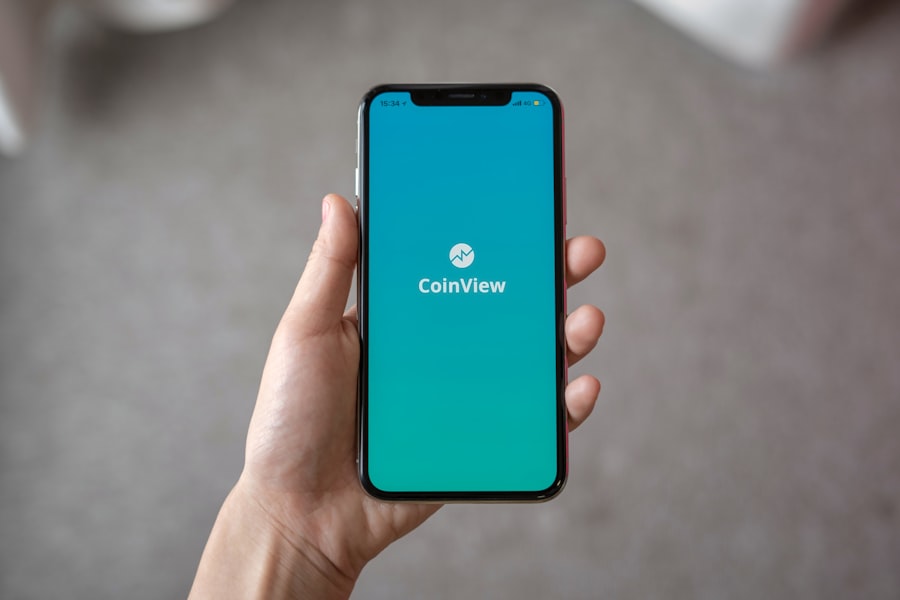In an era where mobile devices have become ubiquitous, the importance of cybersecurity for these gadgets cannot be overstated. Smartphones and tablets are not merely communication tools; they serve as gateways to our personal and professional lives. They store sensitive information, including banking details, personal messages, and even health records.
As a result, they have become prime targets for cybercriminals who exploit vulnerabilities to gain unauthorized access to this data. The increasing sophistication of cyber threats, such as malware, phishing attacks, and ransomware, underscores the necessity for robust cybersecurity measures tailored specifically for mobile devices. Moreover, the rise of the Internet of Things (IoT) has further complicated the cybersecurity landscape.
Many mobile devices are interconnected with other smart devices, creating a network that can be exploited if one device is compromised. For instance, a hacker could infiltrate a smart home system through a vulnerable smartphone app, gaining access to everything from security cameras to smart locks. This interconnectedness amplifies the potential damage that can be inflicted by cyberattacks, making it imperative for users to adopt comprehensive security practices to safeguard their mobile devices.
Key Takeaways
- Cybersecurity for mobile devices is crucial to protect personal and sensitive information from cyber threats and attacks.
- Secure passwords and biometric authentication methods are essential for preventing unauthorized access to mobile devices and accounts.
- Using Virtual Private Networks (VPNs) adds an extra layer of security by encrypting internet traffic and protecting data from potential eavesdropping.
- Regular software updates and patching help to fix security vulnerabilities and protect mobile devices from known exploits and malware.
- Avoiding public Wi-Fi networks can prevent potential security risks such as eavesdropping, man-in-the-middle attacks, and unauthorized access to sensitive information.
Secure Passwords and Biometric Authentication
One of the foundational elements of mobile device security is the use of secure passwords. A strong password acts as the first line of defense against unauthorized access. It is essential to create passwords that are not only complex but also unique for each account.
A combination of uppercase and lowercase letters, numbers, and special characters can significantly enhance password strength. For instance, instead of using easily guessable passwords like “123456” or “password,” users should consider phrases or sentences that are memorable yet difficult to crack, such as “MyDogLoves2PlayFetch!” In addition to traditional passwords, biometric authentication has gained traction as a more secure alternative. Features such as fingerprint scanning, facial recognition, and iris scanning provide an additional layer of security that is difficult for cybercriminals to bypass.
Biometric data is unique to each individual, making it a reliable method for verifying identity. For example, many smartphones now come equipped with advanced facial recognition technology that can unlock the device in a fraction of a second while ensuring that only the authorized user has access. This dual approach—combining strong passwords with biometric authentication—creates a formidable barrier against unauthorized access.
Use of Virtual Private Networks (VPNs)

The use of Virtual Private Networks (VPNs) has become increasingly important in the realm of mobile cybersecurity. A VPN creates a secure tunnel between the user’s device and the internet, encrypting data transmitted over public networks. This encryption protects sensitive information from being intercepted by malicious actors who may be lurking on unsecured networks.
For instance, when accessing sensitive information such as bank accounts or personal emails over public Wi-Fi, a VPN ensures that data remains confidential and secure from prying eyes. Furthermore, VPNs can help users maintain their privacy by masking their IP addresses. This feature is particularly beneficial when accessing geo-restricted content or when users want to browse the internet without being tracked by advertisers or other entities.
By routing internet traffic through a server located in a different region, users can access content that may be unavailable in their geographical area while simultaneously enhancing their online anonymity. The combination of encryption and IP masking makes VPNs an essential tool for anyone concerned about mobile cybersecurity.
Regular Software Updates and Patching
Regular software updates and patching are critical components of maintaining mobile device security. Software developers frequently release updates to address vulnerabilities that could be exploited by cybercriminals. These updates often include security patches that fix known issues and enhance the overall functionality of applications and operating systems.
Failing to install these updates can leave devices susceptible to attacks that exploit outdated software. For example, in 2020, a significant vulnerability was discovered in Android devices that allowed hackers to gain control over affected smartphones through malicious apps. Google promptly released a patch to address this issue; however, many users who delayed updating their devices remained at risk until they took action.
This scenario highlights the importance of enabling automatic updates whenever possible and regularly checking for updates manually. By staying current with software updates, users can significantly reduce their risk of falling victim to cyberattacks.
Avoiding Public Wi-Fi Networks
Public Wi-Fi networks are convenient but pose significant risks to mobile device security. These networks are often unsecured, making it easy for cybercriminals to intercept data transmitted over them. When users connect to public Wi-Fi without proper security measures in place, they expose themselves to various threats, including man-in-the-middle attacks and data theft.
For instance, a hacker could set up a rogue Wi-Fi hotspot with a name similar to a legitimate network, tricking unsuspecting users into connecting and subsequently capturing their sensitive information. To mitigate these risks, users should avoid accessing sensitive accounts or conducting financial transactions while connected to public Wi-Fi networks. If it is necessary to use public Wi-Fi, employing a VPN can provide an additional layer of security by encrypting data transmitted over the network.
Additionally, users should consider using their mobile data plan for sensitive activities whenever possible, as cellular networks generally offer more robust security than public Wi-Fi.
App Permissions and Data Encryption

When installing applications on mobile devices, users often overlook the importance of reviewing app permissions. Many apps request access to sensitive information such as contacts, location data, and camera functionality without providing clear justification for why this access is necessary. By granting these permissions without scrutiny, users may inadvertently expose themselves to privacy risks and data breaches.
For example, a seemingly innocuous game app might request access to a user’s microphone or camera, potentially allowing it to capture audio or video without the user’s knowledge. To enhance security, users should carefully evaluate app permissions before installation and regularly review permissions granted to existing apps. If an app requests access to information that seems excessive or unnecessary for its functionality, it may be wise to reconsider its installation or usage.
Additionally, employing data encryption can further protect sensitive information stored on mobile devices. Encryption transforms data into an unreadable format that can only be accessed with the correct decryption key, ensuring that even if data is intercepted or accessed without authorization, it remains secure.
Two-Factor Authentication
Two-factor authentication (2FA) adds an essential layer of security to mobile device accounts by requiring two forms of verification before granting access. This process typically involves something the user knows (like a password) and something the user possesses (such as a smartphone or hardware token). By implementing 2FA, even if a cybercriminal manages to obtain a user’s password through phishing or other means, they would still need the second factor to gain access to the account.
Many popular services now offer 2FA as an option for account security. For instance, platforms like Google and Facebook allow users to enable 2FA through SMS codes or authentication apps like Google Authenticator or Authy. This added step may seem inconvenient at times; however, it significantly enhances account security by making unauthorized access considerably more challenging for attackers.
Users should take advantage of this feature wherever possible to bolster their defenses against potential breaches.
Safe Browsing and Phishing Awareness
Safe browsing practices are crucial in protecting mobile devices from cyber threats. Users should be cautious when clicking on links in emails or text messages, especially if they appear suspicious or come from unknown sources. Phishing attacks often masquerade as legitimate communications from trusted entities in an attempt to trick users into revealing sensitive information such as passwords or credit card numbers.
For example, a phishing email might appear to be from a bank requesting account verification; clicking on the link could lead users to a fraudulent website designed to capture their credentials. To combat phishing attempts effectively, users should verify the authenticity of any communication before taking action. This can involve checking the sender’s email address for discrepancies or directly contacting the organization through official channels rather than using links provided in suspicious messages.
Additionally, employing web filtering tools can help block access to known phishing sites and malicious content while browsing the internet on mobile devices. By remaining vigilant and informed about safe browsing practices, users can significantly reduce their risk of falling victim to cyber threats while using their mobile devices.
When considering cybersecurity tips for mobile devices, it’s essential to stay informed about the latest technology and how it can impact your security strategies. A related article that explores the features of the Samsung Galaxy Book Odyssey can provide valuable insights into the security features integrated into new devices. You can read more about these features and how they might influence your mobile device security by visiting Exploring the Features of the Samsung Galaxy Book Odyssey. This information can be crucial for understanding potential vulnerabilities and the necessary precautions to take with newer technology models.
FAQs
What are some basic cybersecurity tips for mobile devices?
– Keep your device’s operating system and apps updated
– Use strong, unique passwords for all accounts
– Enable two-factor authentication when available
– Be cautious of public Wi-Fi networks
– Install reputable antivirus and security software
Why is cybersecurity important for mobile devices?
Cybersecurity is important for mobile devices because they are often used to access sensitive information and perform financial transactions. Without proper security measures, mobile devices are vulnerable to hacking, data breaches, and identity theft.
How can I protect my mobile device from malware and viruses?
To protect your mobile device from malware and viruses, you should regularly update your operating system and apps, avoid downloading apps from unknown sources, and install reputable antivirus and security software.
What should I do if my mobile device is lost or stolen?
If your mobile device is lost or stolen, you should immediately contact your mobile service provider to suspend service and report the loss to the police. You should also remotely wipe the device if possible and change the passwords for any accounts that were accessible on the device.
What are some common signs that my mobile device has been hacked?
Common signs that your mobile device has been hacked include unexpected or unauthorized purchases, unusual battery drain, unexplained data usage, and strange pop-up messages or notifications. If you notice any of these signs, you should immediately take steps to secure your device and investigate the issue.

